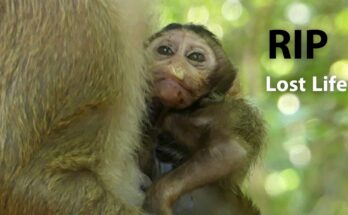It was just another sleepy afternoon in the village of Ranikhet. The sun, lazily sinking into the hills, cast golden shadows over the terraced fields and tin rooftops. In one small home on the edge of the forest, Mother had just put the baby down for a nap. The breeze swayed the curtains gently, and everything seemed peaceful—until the monkeys came.
The monkeys had always been around. The villagers tolerated them, even found them amusing at times. They would scurry across the roofs, peek through windows, and sometimes snatch fruit from the market stalls. But they had never come so close—never into someone’s home.
Earlier that day, Mother had gone to the market, cradling her baby in one arm and a nearly empty milk bottle in the other. She needed more milk and a few other things. The vendor gave her a warning with her change, “Keep an eye out. The monkeys have been getting bold. One even snatched my lunch.”
Mother had smiled politely, thinking little of it. She didn’t like to worry. She had her routine—milk for the baby, vegetables for dinner, and back home before the sun dipped too low.
When they returned, she prepared a fresh bottle and fed the baby, who fell asleep quickly in the warm afternoon quiet. Mother stepped out to collect laundry from the backyard clothesline, no more than two minutes away. But two minutes was all it took.
From the treetops above, the monkeys had been watching. One of them—a large male with a scar over his eye—chittered something the others seemed to understand. It wasn’t just mischief this time. It was hunger. A drought earlier that season had dried up many of the fruit trees nearby, and the forest was no longer providing.
Inside the house, the leftover bottle of milk sat on the small table by the baby’s cradle. The scent had drawn them in like a magnet. First came one monkey, then three, then five, slipping in through the open window like silent thieves.
By the time Mother heard the shrill cries of the baby and rushed back inside, it was too late. The cradle had been rocked sideways. The baby was crying—not hurt, just frightened—and the bottle was gone. Through the window, she saw them leaping across the fence with it, milk sloshing in the bottle, one monkey clutching it like a prized treasure.
She was frozen for a second, then swept the baby into her arms and ran out the door, shouting, “What happened?! Why did the monkeys steal the baby’s milk?!”
The neighbors heard her and came running. Someone laughed—nervously—others shook their heads. No one could remember monkeys stealing something so specific, something meant for a human child.
“Why Mother?” one of the older women asked, meaning, why had she left the window open? Why hadn’t she locked the milk away?
Mother didn’t answer. She held her baby close and stared into the trees where the monkeys had vanished.
That night, the village elders called a meeting. They decided to contact the forest rangers. “We’ve been taking the forest for granted,” one man said. “They’re only coming closer because they have nothing left.”
In the days that followed, the villagers began covering their windows, keeping food sealed, and leaving fruits at the edge of the forest—offerings, of a sort. A silent understanding.
Mother still thinks about that day. About how hunger and survival blurred the lines between their world and the monkeys’. She never leaves the window open anymore, but she doesn’t hate them. She just whispers to the baby, who is older now, “We share this earth with many. Some are just hungrier than others.”
And somewhere deep in the forest, a monkey with a scar still remembers the taste of that warm, sweet milk.
